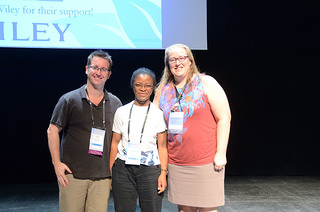|
Julie Hanta Razafimanahaka (center) receiving the Young Women in Conservation Biology award at ICCB-ECCB 2015. |
Julie Hanta Razafimanahaka is the director of Madagasikara Voakajy , an organization specializing in biodiversity conservation in Madagascar. In August, Julie received the Young Women in Conservation Biology award at the International Congress for Conservation Biology. She talked with SCB about her experience in the field of conservation, her work in Madagascar and advice for other women in conservation.
How did you become interested and involved in the field of conservation?
I love traveling. This is one of the reasons why I integrated the Guides movement as a child, and chose the Forestry and Water Department when I was at university. At 13, I first saw the indris (Indri indri) when I was camping with the Guides in Andasibe National Park. The sound of the indris is amazing and I always wanted to go back and see them. Later on, when I was finishing my studies at the university, I was in the field with young, encouraging and passionate bat researchers who inspired me continue my career in conservation.
Tell us about your work and how you arrived at the position you are in?
I started my career as a bat researcher (2004-2007). My favorite moments during that period were when I was talking about bats in a classroom, or at a meeting with adults, where people wonder why I am interested in bats. I am particularly interested in understanding the links between people and nature. I love talking about my experience in the field to inspire more people to engage in biodiversity conservation. Throughout my career, I have been supported by a dedicated team, sharing the same interest and passion. This is why I have become director of Madagasikara Voakajy since 2011.
What's one of the greatest challenges you've faced in your career thus far?
One of the greatest challenges, especially over the past four years, is keeping myself in the office, writing emails and answering phone calls, while my team is facing exciting and challenging events out in the field. This is often difficult to admit.
What do you enjoy most about your work?
One of my responsibilities is to communicate our work with our existing and potential partners, at the local, national and international levels. This is what I most enjoy in my current job.
How is conservation viewed in Madagascar? Are the Malagasy people receptive to conservation efforts?
There is a lot of confusion on the views of conservation in Madagascar. Most Malagasy legends and traditional games are based on nature and wildlife, so we are originally conservation-minded people. Finding the right equilibrium between conservation and social and economic development became more and more challenging over the years. Illegal wildlife trafficking has made the situation even worse. In my opinion, Malagasy people would still like to conserve Madagascar’s biodiversity and understand the reasons why they need to do so, but most of us are quite desperate wondering if that would be feasible. This is why organizations, like Madagasikara Voakajy, have to step up, inspire and demonstrate that this is possible.
Madagascar has had its share of conservation challenges over the past couple of decades. Where is the country now, in terms of conservation policy, and where do you see it going in the next decade?
As I mentioned before, I agree we have been challenged by nature and ourselves over the past decades. Nonetheless, the number of people and conservation organizations in Madagascar also increased. Recently, these organizations started to combine their voice and efforts to achieve a greater impact on biodiversity conservation. Hence, I am still optimistic that we will be able to improve the status of our biodiversity in the next decade.
7. You received the Young Women in Conservation Biology award at the International Congress for Conservation Biology in August. What was your reaction to winning that award and what advice would you give to other young women in the field of conservation?
Yes, I received this prestigious award in August 2015 and I feel very proud of myself, my team and Madagascar. In fact, I would not have received this award if the efforts we were putting in conservation in Madagascar were not productive. I have to admit that there are still many challenges waiting for us, like other people working in the field of conservation too. So, my advice to other young women – and men – is not to give up, in any case.
